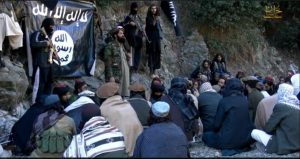Daesh Members in Kabul, are Government Employees

Members and supporters of Daesh cells in Kabul hide in the open, living with their families and going to classes or work every day, said Borhan Osman, a senior analyst with the International Crisis Group.
Middle-class Afghans turned extremists have assisted Daesh´s expansion from its stronghold in Afghanistan´s restive east to Kabul, analysts say, helping to make the capital one of the deadliest places in the country.
Meanwhile, Daesh has claimed nearly 20 attacks across Kabul in 18 months, with cells including students, professors and shopkeepers evading Afghan and US security forces to bring carnage to the highly fortified city.
“This is not just a group that has a rural bastion in eastern Afghanistan — it is staging high casualty, high visibility attacks in the nation´s capital and I think that´s something to be worried about,” said analyst Michael Kugelman of the Wilson Center in Washington.
This comes as Mr. Osman said, “we are talking about a generation which has been desensitized to different types of violence and violent extremism.”
“You can´t say they are all poor — a number of them come from middle-class Kabuli families. Some are university educated. Some have a high school education,” he said, adding that most have some religious education as well.”
The militants meet at night to discuss “holy war”, and plot attacks on targets in the city they know well — well enough to adapt to changes, such as tightened security in the wake of a massive truck bomb in May that killed around 150 people.
“It´s an adaptive structure reacting to the counter measures,” a Western diplomat told AFP.
The group´s resilience has raised fears that Afghanistan could become a new base for Daesh fighters fleeing the battlefields of Syria and Iraq, where the group has lost swathes of territory. But the exact nature of links between Daesh in Afghanistan and the Middle East remains unclear.